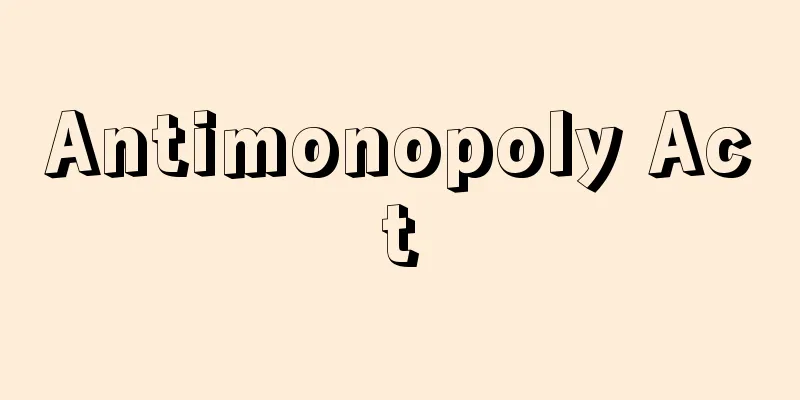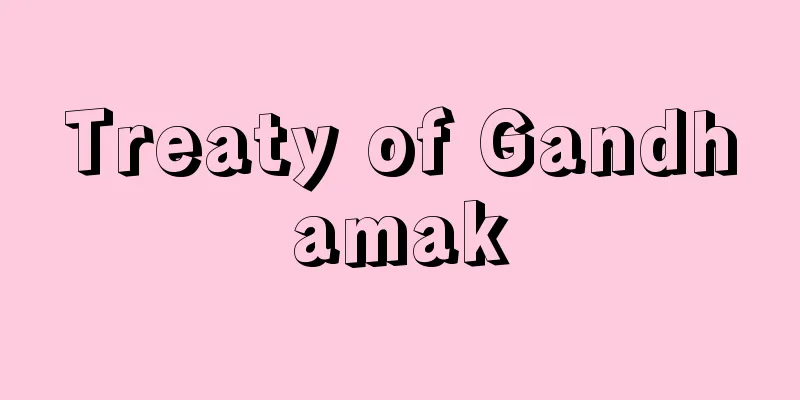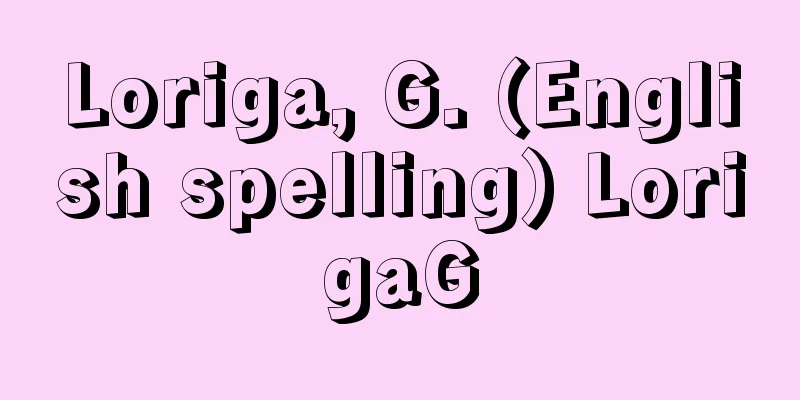Antimonopoly Act

|
In 1947 (Showa 22), as part of the occupation policy of GHQ (General Headquarters of the Supreme Commander for the Allied Powers), this law was modeled on the American Antitrust Act. Its official name is the "Act on Prohibition of Private Monopolies and Maintenance of Fair Trade" (Act No. 54 of 1947). It is generally referred to as the Antimonopoly Act, and is sometimes abbreviated to the "Monopoly Act." The enforcement body is the Fair Trade Commission (FTC). Its purpose is to ensure fair competition between businesses, thereby promoting the democratic and healthy development of the national economy and protecting the interests of consumers, and it plays a central role in the field of economic law. [Ken Kanazu January 19, 2016] overviewThe Antimonopoly Act applies to perpetrators of illegal activities, such as business operators, trade associations, officers and employees, and prohibits three types of illegal activities - private monopolies, unreasonable trade restraints, and unfair trade practices (the three pillars of the Antimonopoly Act) - and is also made up of various supplementary provisions to curb these prohibited activities. The first pillar is the prohibition of private monopolies. The reason why it is called "private" monopoly rather than just monopoly is because it was necessary to distinguish it from the monopoly (public monopoly) that was recognized by law at the time, and it does not refer to the ownership form of a company. A private monopoly is a case where a business operator who has succeeded in acquiring market power unfairly controls the business activities of other business operators (dominant private monopoly) or excludes them from the market (exclusionary private monopoly). It is not simply a case where a business operator wins a competition in the market and expands its scale, resulting in the exclusion of competitors, but it prohibits the misuse of the acquired market power to hinder fair competition between businesses in the market. Similarly, mergers, management integration, holding companies, and concurrent directorships between companies are also subject to regulation because they increase the concentration of business control and may hinder competition between businesses. Furthermore, there is a provision that if a monopoly state in which one company has a market dominance of more than 50%, the Japan Fair Trade Commission may order the transfer of part of the business in order to restore competition. The second pillar is the prohibition of unfair trade restrictions. These are most commonly referred to as cartels or bid rigging. A cartel is an agreement to cease competition made between multiple businesses in a competitive relationship. For example, in the case of a price cartel, a product that had previously been sold at a variety of prices becomes, through an agreement between the businesses, priced at the same level, ignoring the price mechanism. The same can be said for bid rigging in public works projects. Strict regulations are imposed due to the strong impact it has on the national economy. The third pillar is the prohibition of unfair trade practices. While private monopolies and unfair trade restrictions aim to create, maintain, and strengthen market power of businesses, unfair trade practices can be considered preventive provisions that focus on preventing the creation of market power by regulating acts that may hinder fair competition. Acts that fall under unfair trade practices are stipulated as joint refusals to trade, discriminatory prices, unfair sales at low prices, resale price restrictions, and abuse of dominant position. In addition, a designation system by the Japan Fair Trade Commission has been introduced, whereby the Japan Fair Trade Commission designates acts that may hinder fair competition, and unfair sales at low prices, deceptive customer inducements, and bundled sales are subject to regulation (general designation). In addition, unfair trade practices by large retailers, unfair trade practices by specific shippers, and unfair trade practices in the newspaper industry are designated as acts that are subject to regulation only in specific industries (special designation). Furthermore, the 2000 amendment made it possible for people who suffer or are likely to suffer damage from unfair trade practices to apply to the court to stop or prevent the infringing act (injunction claim). [Ken Kanazu January 19, 2016] PenaltiesSanctions for violations are mainly administrative sanctions, and fines and imprisonment as criminal sanctions. The scope of acts and calculation rates for surcharges have expanded, and currently, private monopolies, unfair trade restrictions, international agreements and contracts, acts of trade associations, and some unfair trade practices are subject to surcharges. The amount of the surcharge is calculated by multiplying the sales amount during the period of the illegal act by a certain calculation rate in order to eliminate the discretion of the Japan Fair Trade Commission, which is an administrative agency. The 2005 amendment introduced a surcharge reduction system, which allows businesses to reduce or waive sanctions by reporting to the Japan Fair Trade Commission the facts of bid rigging or cartels in which they were involved. Criminal penalties are prosecuted after the Japan Fair Trade Commission requests the Prosecutor General to file criminal charges. For example, heavy penalties are stipulated for private monopolies, unfair trade restrictions, and acts restricting competition by trade associations, such as imprisonment of up to five years or a fine of up to 5 million yen, and for corporations, a fine of up to 500 million yen. However, the number of criminal charges was around 20 as of 2015, which is only a small portion of the violations uncovered by the JFTC. [Ken Kanazu January 19, 2016] HistoryAfter the war, Japan was occupied by GHQ, and the Antimonopoly Act was enacted as part of the occupation policy towards Japan, with the aim of realizing the "democratization of the economy." GHQ believed that the prewar economic system, which was based on the holding company system and dominated by zaibatsu, was one of the factors that led Japan into war, and in November 1945, they established the Holding Company Reorganization Committee and dissolved the zaibatsu. In 1947, the Act on the Elimination of Excessive Concentration of Economic Power (Act No. 207 of 1947) divided companies with market dominance. The Antimonopoly Act played a role in maintaining the liberal, capitalist economic system so that we would not return to the prewar economic system. [Ken Kanazu January 19, 2016] Changes in the lawWhen the Antimonopoly Act was first enacted, it contained strict provisions such as prohibiting the establishment and conversion of holding companies, generally prohibiting the holding of shares in operating companies, and requiring approval for mergers that were permitted only in extremely limited cases. However, the 1949 and 1953 amendments significantly relaxed the regulations. Antimonopoly policy subsequently stagnated, and in the 1960s, there was a sharp increase in the number of re-mergers of companies that had been split up under the Act on the Elimination of Excessive Concentration of Economic Power. However, the 1977 amendments, due to rising prices caused by the oil shock and the black market oil cartel incident, led to growing public calls for stricter regulations, and so regulations were strengthened, including the introduction of a surcharge system and restrictions on monopoly states. The 1997 amendments lifted the ban on the holding company system, but stricter amendments continued to be made thereafter. The 2005 amendments increased the surcharge assessment rate, introduced a surcharge reduction system, revised the adjudication procedures to allow for a swift response to violations, and also gave the JFTC the power to investigate violations by issuing a warrant. The 2009 amendments expanded the scope of conduct subject to surcharges, diversified the surcharge reduction system, and increased the penalties for cartels. While the Antimonopoly Act has been made stricter, the 2013 amendment abolished the arbitration system, which is the symbolic authority of the Japan Fair Trade Commission. Until then, if a company was dissatisfied with the JFTC's cease and desist measures or surcharge payment orders, it had been possible to file an appeal with the JFTC (the arbitration system), but this was done in response to complaints from the business community about the ability to file an appeal against the administrative agency that had issued the order. [Ken Kanazu January 19, 2016] "New Edition: Outline of the Antimonopoly Act, by Osami Tanihara, 3rd Edition (2011, Chuo Keizai-sha) " "Learning the Antimonopoly Act from the Provisions, by Kazuhiro Tsuchida, Makoto Kurita, Yoshizumi Tojo, and Kuninobu Takeda, 2014, Yuhikaku" " Lectures on the Antimonopoly Act, by Narifumi Kubo and Hiroaki Tanaka, 3rd Edition (2014, Chuo Keizai-sha)" [Reference items] | | | | | | | | | |Source: Shogakukan Encyclopedia Nipponica About Encyclopedia Nipponica Information | Legend |
|
1947年(昭和22)、GHQ(連合国最高司令官総司令部)による占領政策の一環としてアメリカ反トラスト法を手本として制定された法律。正式名称は「私的独占の禁止及び公正取引の確保に関する法律」(昭和22年法律第54号)。独占禁止法と呼称されることが一般的で、独禁法と略称されることもある。執行機関は公正取引委員会(公取委)。事業者間の公正な競争を確保することにより、国民経済の民主的で健全な発達、および消費者の利益確保を目的としており、経済法分野における中心的役割を担う法律である。 [金津 謙 2016年1月19日] 概要独禁法は、事業者・事業者団体、役員・従業員など違法行為の実行役を適用対象とし、私的独占、不当な取引制限、不公正な取引方法の3類型を禁止するとともに(独禁法の3本の柱)、これら禁止行為を抑制するためのさまざまな補完規定から構成される。 第一の柱は、私的独占の禁止である。単なる独占ではなく「私的」独占としたのは、当時法律で認めていた独占(公的独占)と区別する必要があったためで、企業の所有形態を表すものではない。私的独占とは、市場支配力を獲得することに成功した事業者が、不当に他の事業者の事業活動を支配(支配型私的独占)、もしくは市場から排除(排除型私的独占)するような場合である。単に事業者が市場での競争に勝利し、その規模を拡大した結果、競争者が排除されるような場合ではなく、獲得した市場支配力を悪用し、市場における事業者間の公正な競争を阻害することを禁止しているのである。また、同様に企業間の合併、経営統合、持株会社、役員の兼任なども事業支配力の集中度が高まることで、事業者間の競争が阻害されるおそれが生じることから、規制の対象としている。さらに、市場支配率が1社で50%を超えるような独占的状態にある場合、競争回復のため、公取委により事業の一部譲渡が命ぜられる旨の規定がある。 第二の柱は、不当な取引制限の禁止である。一般にはカルテル、入札談合と呼称されることがきわめて多い。カルテルは競争関係にある複数事業者間において交わされる競争停止契約である。たとえば価格カルテルの場合、それまでさまざまな価格で販売されていた商品が、事業者間の合意により、価格メカニズムを無視した横並びの価格となってしまうのである。公共工事などで行われる入札談合も同様である。国民経済に対して与える影響が強いことから厳格な規制が行われている。 第三の柱は、不公正な取引方法の禁止である。私的独占、不当な取引制限が事業者の市場支配力を形成し、維持・強化することを目的としているのに対して、不公正な取引方法は、公正な競争を阻害するおそれのある行為を規制することにより、市場支配力の形成を未然に防止することに重点をおいた予防的規定といえる。不公正な取引方法に該当する行為には、共同の取引拒絶、差別対価、不当廉売、再販売価格の拘束、優越的地位の濫用が規定されている。さらに、公取委による指定制度が導入されており、公取委が公正な競争を阻害するおそれのある行為を指定し、不当廉売、欺瞞(ぎまん)的顧客誘引、抱き合わせ販売などが規制対象とされている(一般指定)。そのほか、特定の業界のみが対象となる行為として、大規模小売業者が行う不公正な取引方法、特定荷主が行う不公正な取引方法、および新聞業界の不公正な取引方法を指定している(特殊指定)。また2000年(平成12)改正で、不公正な取引方法により損害を受けるかもしくは受けるおそれがある場合、裁判所に対してその侵害行為の停止、もしくは予防を請求することが可能となっている(差止請求)。 [金津 謙 2016年1月19日] 罰則違反行為に対する制裁は、主として行政罰である課徴金、刑事罰として罰金刑と懲役刑が規定される。課徴金はその対象行為と算定率が拡大し、現在では私的独占、不当な取引制限、国際協定・契約、事業者団体の行為、不公正な取引方法の一部が対象となる。また、課徴金額は行政機関である公取委の裁量を排除する目的から、違法行為実施期間の売上額に一定の算定率を乗じた金額となっている。2005年改正により、事業者が自ら関与した入札談合やカルテルの事実を公取委へ申告することにより制裁措置が減免される課徴金減免制度が導入された。刑事罰については、公取委より検事総長への刑事告発依頼を待って、訴追が行われる。たとえば私的独占、不当な取引制限、事業者団体の競争制限行為に対しては、5年以下の懲役もしくは500万円以下の罰金、および法人に対しては5億円以下の罰金が科されるという重い刑罰が規定されている。しかし、刑事告発された件数は2015年時点で20件程度であり、公取委が摘発した違反事件のごく一部に限定されている。 [金津 謙 2016年1月19日] 沿革日本は戦後GHQによる占領を受けるが、独禁法はその対日占領政策、「経済の民主化」を実現する目的から制定された法律である。GHQは戦前の持株会社方式による財閥支配型の経済体制が、日本を戦争に導く一因となったと考え、1945年11月、持株会社整理委員会を設立し財閥を解体。1947年過度経済力集中排除法(昭和22年法律第207号)により、市場支配力をもつ企業を分割した。独占禁止法は、ふたたび戦前の経済体制に戻ることのないよう、自由主義・資本主義経済体制を維持する役割を担うこととなる。 [金津 謙 2016年1月19日] 法の変遷制定当初の独禁法は、持株会社の設立・転化禁止、事業会社の株式保有の原則禁止、合併は認可制とし、きわめて限定的な場合のみ認めるなど、厳格な規定を設けていたが、1949年改正、1953年改正により大幅な規制の緩和が行われた。その後、独禁法政策は低迷し、昭和40年代には、過度経済力集中排除法により分割された企業の再合併などが急増する。しかし、1977年改正は、オイル・ショックによる物価高、さらに石油闇(やみ)カルテル事件などにより、国民による規制強化の声が高まったことから、課徴金制度の導入、独占的状態の規制など、規制が強化された。1997年(平成9)改正で持株会社制度が解禁されるが、その後も厳格化の改正は続く。2005年改正により、課徴金算定率の引上げ、課徴金減免制度の導入、違反行為への迅速対応を可能とする審判手続の見直しが行われ、さらに公取委に令状に基づく強制捜査を認める犯則調査権限が導入されている。2009年改正では、課徴金の対象行為が拡大され、課徴金減免制度の多様化、カルテルに対する懲役刑の厳罰化が行われた。 このような独禁法厳格化の一方で、2013年改正では、公取委の象徴的な権限である審判制度が廃止された。それまで、公取委の下した排除措置・課徴金納付命令に不服である場合、公取委に不服申立てを行うこと(審判制度)が定められていたが、処分庁に対して不服申立てをすることに対しての経済界からの不満の声にこたえたものである。 [金津 謙 2016年1月19日] 『谷原修身著『新版 独占禁止法要論』第3版(2011・中央経済社)』▽『土田和博・栗田誠・東條吉純・武田邦宣著『条文から学ぶ独占禁止法』(2014・有斐閣)』▽『久保成史・田中裕明著『独占禁止法講義』第3版(2014・中央経済社)』 [参照項目] | | | | | | | | | |出典 小学館 日本大百科全書(ニッポニカ)日本大百科全書(ニッポニカ)について 情報 | 凡例 |
>>: Monopoly - dokusen (English spelling) monopoly English
Recommend
Kusamura Hokusei
…Although they did not always aim for a happy end...
Sphaeroma sieboldii (English spelling) Sphaeromasieboldii
…[Shigeo Gamou]. … *Some of the terminology that ...
Alpine orogeny - Alpine orogeny
…The Hohe Tauern region in central Austria is sai...
Mandibular foramen - science
…the upper end of the ramus divides into an artic...
K'ucumatz (English spelling) Kucumatz
...Linguistically, the indigenous Quiche language...
Reptilia
...The oldest of this group is the Placodermi, wh...
Eigen, Manfred
Born: May 9, 1927 in Bochum [Died] 2019.2.6. Physi...
Kawara [town] - Kawara
A town in Tagawa County in the central eastern par...
Brown clay
Brown clay is a pelagic clay containing less than ...
Winterhoff, H.
…It is also called a vibraphone. In 1916, H. Wint...
Rhodophyllus rhodopolium (English spelling) Rhodophyllus rhodopolium
…[Rokuya Imaseki]. . … *Some of the terminology t...
Kanbun Kaitai - Kanbun Kaitai
...Finally, due to financial difficulties, the Ge...
Shiite - Shi'a (English spelling)
A general term for the various sects that, along ...
Kyoson Tsuchida
Philosopher and critic. Born to a wealthy farming...
Cassini, GD (English spelling) CassiniGD
…A family of French astronomers. Four generations...









